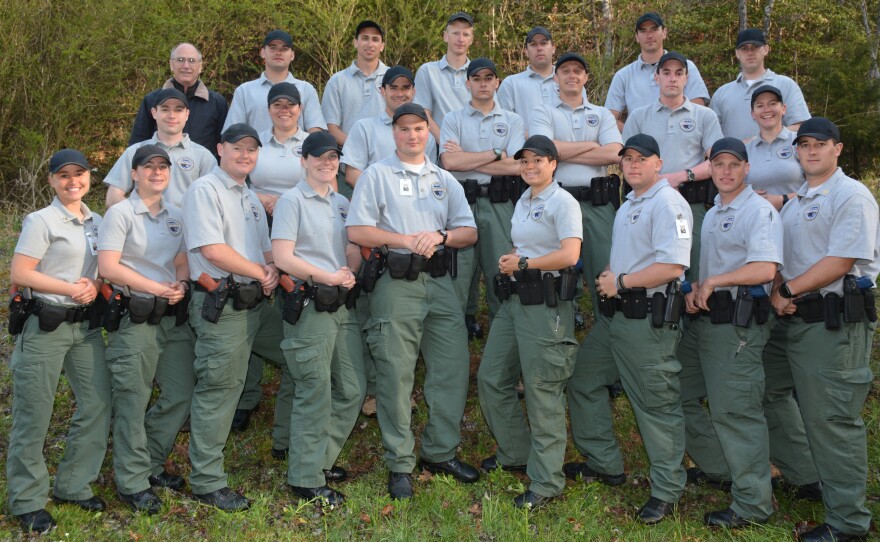If you visit a National Park, there’s a good chance you’ll cross the path of a ranger who was trained right here in Western North Carolina. Southwestern Community College in Sylva is one of only seven colleges in the nation that offers the National Park Service Seasonal Law Enforcement Training Academy.
The program is one of the oldest in the country and just graduated its 100th class. BPR’s Helen Chickering visited the academy while school was still in session.
It’s a chilly sunny morning, and about a dozen men and women are scattered across a large gravel parking lot at the Industrial Park in Franklin, They are all dressed in matching dark jackets and green pants, with a gun belt around their waist and a clipboard in their hand.
Some are weaving around vehicles; others are talking to drivers sitting inside their car.
“Hi there sir, how are you?”
It looks a bit like a low key crime scene investigation is underway, but the lot is actually a classroom run by Southwestern Community College. The men and women in uniform are cadets, training to become law enforcement rangers with the National Park Service. The college opened one of the country’s first training programs back in 1978, the cadets scouring the parking lot today are part of the Southwestern Community College’s 100th class.
Retired Blue Ridge Parkway Chief John Garrison is a graduate of the program and now he’s back as an instructor.
“ It’s an opportunity to work with what I think is a great generation of young people, “ says Garrison, “if we can help them move into careers of continued public service, that’s a pretty good reward for me at the end of the day.”
After graduation and once they are commissioned as U.S. Park Rangers, these 22 cadets, who come from all over the country to train here, will be authorized to carry firearms, make arrests and investigate crimes. But to get there, they’ll go through more than 650 hours of intense training.
“Hello, my name is officer Greenan with the National Park Service”
“This is where our cadet is working through a foot patrol in the parking lot,” says John Garrison as he describes the scenario behind the parking lot class, “It’s a public area and the concern is there has been a break in in the cars”
“What are you doing here?”
Cadet Carolyn Greenan has approached a man sitting in his car, (he’s actually an actor) and while he isn’t part of the break-in scheme, he is breaking the law.
“What are you drinking there? Oh a Milwaukee’s Best, you know that’s an open container,” says Greenan.
“That’s the only way I can drink it mam,” the driver replies.
“Do you mind putting it down, and can I have your license and registration.”
HC: So tell me about this exercise, what was going through your head?
“I struggled a little bit there, laughing with the things he was telling me, but hopefully I’ll do a little bit better.”
Greenan is a UNCA graduate, from Virginia and says the program is a great way to combine her passion for law enforcement with her love for the outdoors.
“Everything the National Parks bring, really excited me so being able to protect that and enforce the laws, protect the people who come through there, I’m looking forward to doing that.”
Cadet Kyle Campbell of Indiana says he wanted to see a different side of the Park Service .
“And once I got here I knew this is what I needed to do and what I wanted to do for the rest of my life,“ says Campbell who was who was practicing interrogating skills with fellow cadet and Dana Breakell of Connecticut. Both have worked as interpretive rangers for the National Park Service. Those are the rangers who give tours, provide directions and information.
“One of the failings of interpretation that I saw is that I didn’t have any authority to enforce anything, “ says Breakell, “ I could tell people you can’t park there, you can’t kick over those trees, but I couldn’t do anything about it.”
“ So now, I’ll be able to take a more active role in protecting the parks, and that’s what I’m really interested in, more of the conservation, the protection of the parks, but then there is the bonus of engaging with people, help out, tell them where the bathroom is, the good hiking trails, It’s kind of the best of both worlds.”









